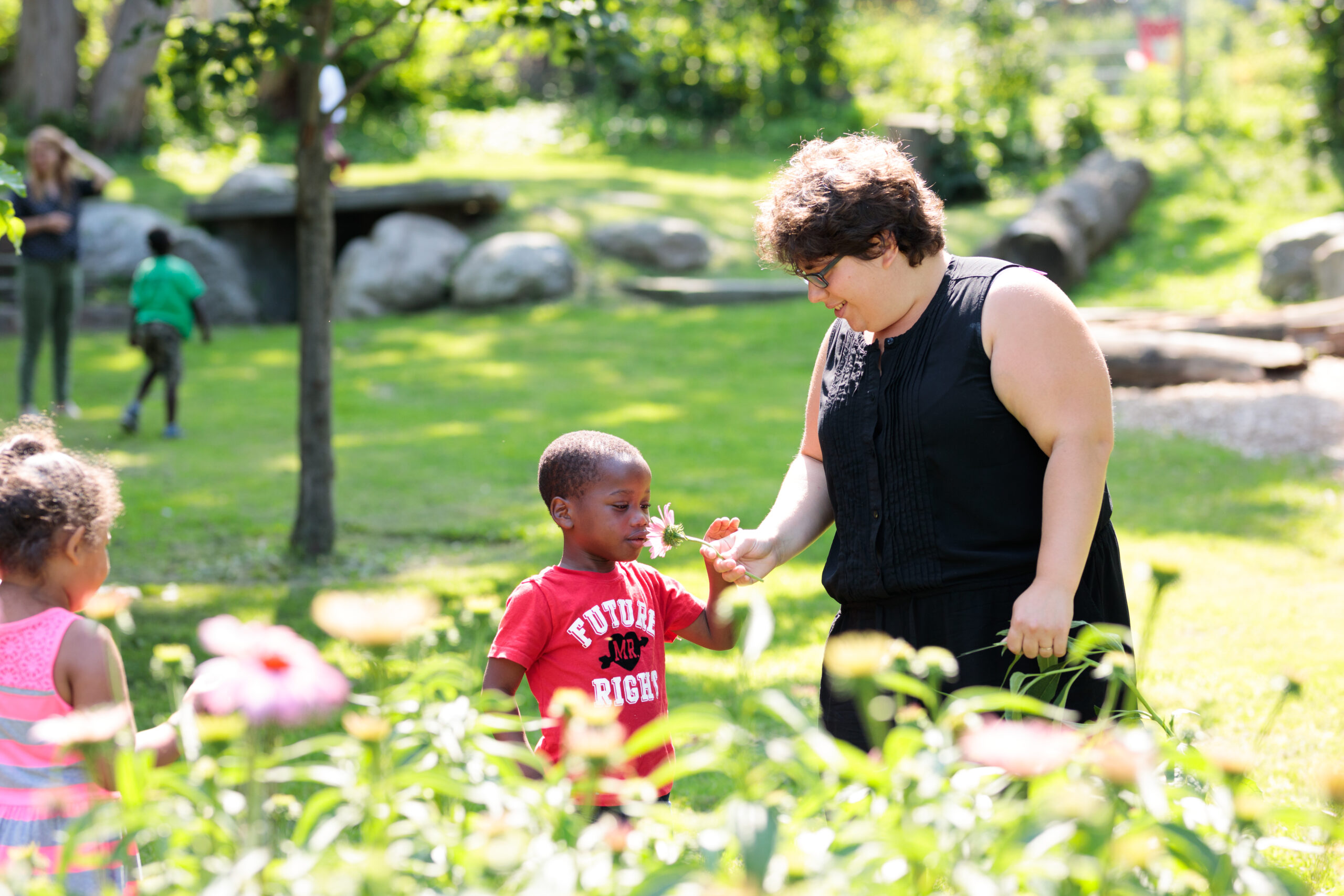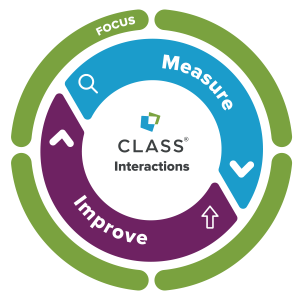CLassroom Assessment
Scoring System
VTAEYC CLASS Strategies Series
January 14 – March 25, 2025
Join VTAEYC and Teachstone® for a series of interactive virtual sessions for Infant, Toddler, and Pre-K educators. Each short virtual session offers actionable content and practical strategies you can use in the classroom right away.
What is CLASS?
CLASS is an acronym of Teachstone’s observation tool, the CLassroom Assessment Scoring System®. It measures what matters most to children’s learning and development: interactions among educators and children.
But CLASS is more than a measurement tool. It also provides a specific descriptions of impactful educator-child interactions, based on research. These descriptions are a shared language for educators to use as they improve their practice. With CLASS at the center of continuous quality improvement, educators can focus on the interactions that impact children most.

The CLASS Framework
Continuous quality improvement is an on-going process that requires educators to be intentional and focused on setting goals. CLASS can support goal setting in two unique ways:
- It offers a framework and resources that align with a plan-do-study-act approach
- It empowers an ongoing journey toward improvement with flexible offerings that meet your needs
The CLASS Framework is comprised of 3 tools:
Infant
Toddler
Pre-K
Frequently Asked Questions
Programs and school districts across the country (and internationally!) use CLASS to help ensure all children in their programs have equal access to effective educator-child interactions. Effective interactions do not require large budgets, lots of materials, and huge amounts of preparation time. This system supports educators in focusing on, measuring, and improving the elements of classroom experience that matter most for supporting children’s learning and development.
Certified CLASS observers use the CLASS tool to capture the quality of the educator-child interactions they see in a classroom or program across 3 Domains. These observers look for certain behavioral markers. They then assign scores across each dimension.
During an assessment, an assessor will conduct four scoring cycles which include 15-20 minutes of observation and 10 minutes of scoring completed outside the classroom.
Domains are the broad category of interactions grouped by content area. These include:
- Infant Tool: Responsive Caregiving
- Toddler Tool: Emotional and Behavioral Support and Engaged Support for Learning
- Pre-K Tool: Emotional Support, Classroom Organization, and Instructional Support
Dimensions within each domain contain indicators for effective interactions and behavioral markers. For example in the Emotional Support Domain, the Dimension Positive Climate measures the connections and sense of belonging between adults, children, and peers as a classroom community.
CLASS is an observation tool that rates the quality of interactions within a classroom or
childcare setting: interactions between teachers and children, children to children, and teachers
to teachers. In using the CLASS tool, we are looking for things like: Are children comfortable
and loved in their classroom? Do children have their needs met, know how to ask for help, and
feel safe? Is learning and language supported in the classroom? Are teachers engaged with
children? Do teachers genuinely enjoy and care about their work with children?
You should request a scored assessment, if your request for a program assessment falls within the pilot period of using the CLASS assessment tool (ending June 2025). For this reason, it is recommended to receive a scored assessment as a program’s STARS level cannot be reduced during the pilot period. Additionally, the program’s STARS certificate and level will remain valid for 3 years from having received a scored assessment.
Low-range scores (1–2): the behaviors were lacking, rarely present, or of low quality
Mid-range scores (3–5): the behaviors were somewhat present or a part of just some children’s experience
High-range scores (6–7): the behaviors were consistently present and reflect every child’s experience
For a scored assessment, assessors must observe one classroom from each age range that the program serves, with at least 50% of the total program classrooms being observed. Classrooms for scored assessments are randomly selected by the assessor.
During the observation of each classroom, an assessor will conduct four scoring cycles which include 15-20 minutes of observation and 10 minutes of scoring. Infant and toddler classrooms can be scored during outdoor time, but Pre-K classrooms can not be scored unless the children are engaged in a specific lesson.
Once the entire scored assessment is complete, an Assessor will create and send a report called CLASS Scored Summary Report. The report will be used to determine future STARS Levels, it can be used to guide a program’s improvement goals, and to celebrate the great things things that were observed.
For a consultation, a program may select the classrooms they want observed or feedback on. It is preferred that observations happen during inside classroom time. Infants and Toddlers can be observed outside, but not Preschool.
When a QSS visits a program, they will conduct a few cycles of observation. What this may look like is a QSS being immersed in the classroom and taking notes of what they see and hear for 20 minutes. Then they step aside for 10 minutes to “code”. This process is repeated 2-3 times.
Once the entire consultation is complete, a Quality Support Specialist (QSS) will create and send a report titled CLASS Consultation Report. This report can be used to guide a program’s improvement goals and to also celebrate the great things things that were observed.
Yes, coaching on the CLASS can be requested by completing a general intake form in the SPARQS Portal.
Yes, you can view the recordings of the Introduction to CLASS Series below. You can also request training through a Vermont Early Childhood Network or by completing a general intake form in the SPARQS Portal.
You can visit Teachstone’s website for additional materials, videos, and resources. If you have additional questions about CLASS or SPARQS, please email info@vtaeyc.org or call (802) 234-1090, ext. 4.
CLASS and Coaching
As CLASS is implemented, educators will:
- Focus on high-quality interactions and create a shared understanding of what quality looks like
- Measure the quality of interactions to create a system that enables goal setting and implementation of those goals
- Improve teaching quality through tailored and individualized supports
SPARQS and the Quality Support Specialists will be able to provide training, coaching, mentoring, and technical assistance on the CLASS Tools and CQI plans especially as they relate to CLASS.
Deeper Dive Into CLASS
Introduction to CLASS Training Series Recordings
Each pre-recorded training explores the CLassroom Assessment Scoring System (CLASS) tool and explains how educators can make more meaningful connections with the children in their care. These trainings examine specific CLASS domains, dimensions, and indicators, as well as explores simple ways to incorporate these concepts into your daily interactions.
Ready to Request an Assessment?
The SPARQS Team will be able to conduct both scored CLASS assessments and CLASS consultations.
All registered early childhood education programs and afterschool programs can schedule a CLASS assessment by clicking the button below.

